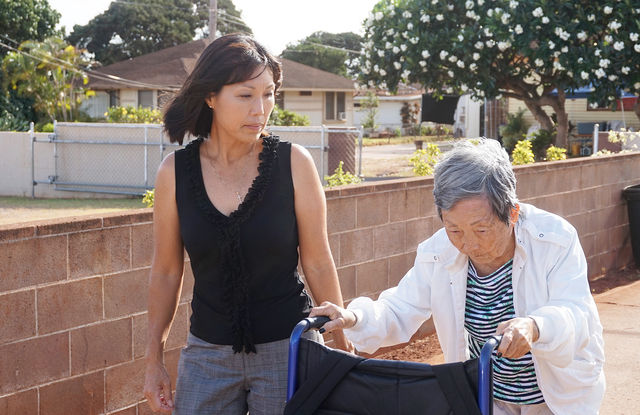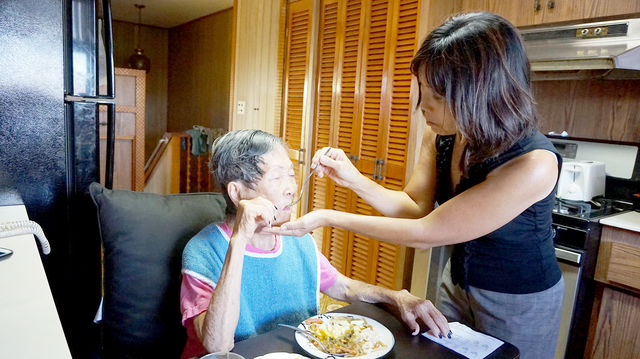HANAPEPE — Fumie Beppu has always been a loving parent. But as her health slowly declined and the crippling symptoms of dementia set in, her daughter, Reni Pereira, knew she needed to be there for her mother. “We do what
HANAPEPE — Fumie Beppu has always been a loving parent. But as her health slowly declined and the crippling symptoms of dementia set in, her daughter, Reni Pereira, knew she needed to be there for her mother.
“We do what we can for our parents,” the Hanapepe Heights resident said. “I think it’s my responsibility, number one, and it’s a form of giving back.”
Although she knew of her prognosis, Beppu insisted on not being placed in a care home. Her daughter listened.
“If I can do it, I would rather keep her at home,” Pereira said.
It’s been difficult.
Dementia affects a person’s cognitive function, resulting in impaired memory communication and language, reasoning and judgment and visual perception.
“She can’t do anything for herself anymore,” Pereira said. “I know what I’m in for and it’s hard to see when your parent is progressively getting worse because you know what’s waiting at the end.”
Pereira has been a caregiver for her mom for the past eight years. She cooks, cleans and takes her and her father on shopping trips.
“I love my parents, and I wish I was able to stay at home and care for them,” Pereira said. “Unfortunately, it is not possible as I have a son who’s in his third year in college and another who’s a senior this year. They will both be in college next year so staying at home is not an option.”
Sixty-five million people within the U.S. are acting as caregivers for family members who are chronically ill, or aged and spending 20 hours a week caring for them, according to the Caregiver Action Network website.
Women make up 66 percent of family caregivers, with up to 37 percent of them having children or grandchildren under the age of 18 living in the same household.
Fortunately, Pereira isn’t alone when she cares for Beppu. Two private caregivers, who are certified nursing assistants, and a retired nurse from Bayada Home Health Care help her by preparing her mother to leave for day care and bringing her to doctors appointments.
“I consider myself very fortunate to have help from these caregivers as it would be impossible to do it all my myself,” Pereira said.
While there are challenges in care giving, Pereira said there are also good days when Beppu can speak as if the disease is non-existent.
“The best time is whenever her old self is back, which is a very rare occasion these days,” she said. “The last time was a few months ago when I had her talk to her sister who lived on Oahu. It was absolutely amazing listening to their conversation as it appeared that her dementia was gone.”
Pereira also cares for her father, Harry Beppu, who has shown symptoms of Alzheimer’s disease. Pereira said she is happy to be there for them both.
“It’s your chance to take care of them when they’ve done so all their lives taking care of you as a child,” she said.
As Pereira continues to care for he parents, she looks to the future with hope and thankfulness.
“I think spending time is the biggest part. I want to consider it quality time,” she said.”I am forever grateful that both my husband and son are always willing to help me.”



